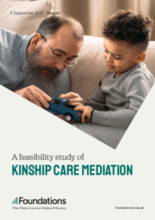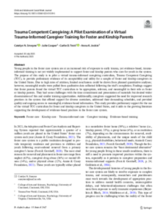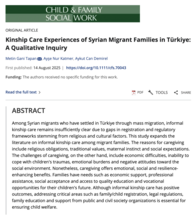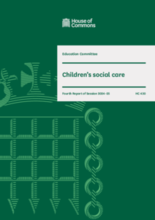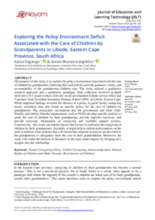Displaying 11 - 20 of 608
Many children in kinship care face trauma, poverty, and strained family relationships, yet their carers often lack adequate support. This feasibility study of Family Solutions’ mediation and positive parenting intervention in South Hampshire, U.K. highlights promising approaches to strengthen communication, reduce conflict, and improve outcomes for kinship families.
This study piloted a virtual trauma-informed caregiving curriculum, Trauma Competent Caregiving (TCC), to assess its acceptability and usefulness for foster and kinship caregivers in the United States. Despite high attrition, qualitative findings indicate that caregivers found the curriculum relevant and meaningful, though they noted challenges with time demands and called for broader access to similar evidence-based training.
Among Syrian migrants who have settled in Türkiye through mass migration, informal kinship care remains insufficiently clear due to gaps in registration and regulatory frameworks stemming from religious and cultural factors. This study expands the literature on informal kinship care among migrant families.
This study explores how trust is built within the Mockingbird Family foster care model in Australia, based on interviews with children, carers, and care networks. Findings show that trust emerges through daily interactions, collaboration, and organizational and political support, rather than being a fixed trait. The study highlights the importance of relationship-centered, interconnected approaches to reimagining foster care.
"Ordinary People, Extraordinary Hearts" is an on-demand training program designed to support kinship carers in Australia in creating safe, nurturing, and healing environments for children and young people in their care.
In this video, practitioners, faith leaders, and a Kafaalah caregiver share experiences in promoting and strengthening Kafaalah as an important part of family-based alternative care in Kenya.
This study investigates how Kinship Navigator Programs (KNPs) help mitigate disparities in caregiving challenges faced by informal kinship caregivers (especially grandparents) of maltreated children. Using Latent Class Analysis, the research identifies three distinct patterns of caregiving challenges: financial, child's behavioral/emotional health, and intergenerational family dynamics.
This report makes a series of recommendations on issues affecting all types of care, including foster care, adoption, kinship care, children’s homes, and support for disabled children in the UK.
This study explores the policy environment for children cared for by grandparents in Libode, Eastern Cape, South Africa, finding no specific policies to guide or support such caregiving. It recommends developing dedicated policies, resources, and information to better equip grandparents, while contributing new insights to scholarship and informing policymakers.
This article investigates the image of an ideal foster grandparent as constructed by social workers, drawing upon 24 in-depth interviews with practitioners from foster care agencies in the Czech Republic.

